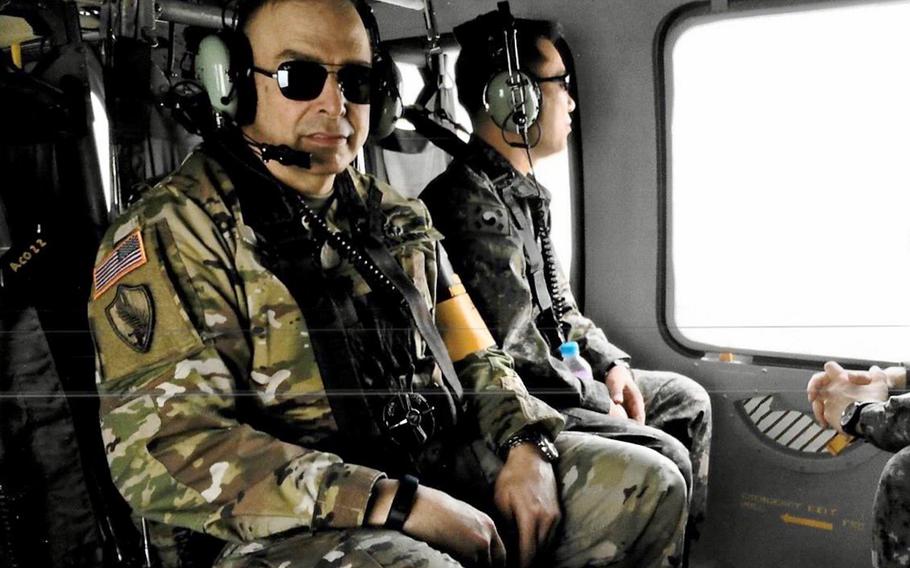
Army Lt. Col. Austin Hamner flies in a helicopter over the Korean Demilitarized Zone in October 2017. (Austin Hamner)
An Army officer whose four-decade career included searching for weapons of mass destruction in Iraq and responding to a Japanese earthquake has retired in Hawaii.
Austin Hamner, 63, who describes himself as the Army’s “longest-serving” lieutenant colonel, will mark his July 1 retirement with an October ceremony aboard the retired battleship USS Missouri at Pearl Harbor.
Hamner was promoted to lieutenant colonel on Jan. 26, 2004, Chief Warrant Officer 2 Antonette Paguirigan, U.S. Army Pacific human resources technician, told Stars and Stripes in an email Tuesday. The command was not able to confirm Hamner’s claim of being the longest serving of his generation at that rank.
A native of Mount Auburn, Ind., Hamner began his military service in 1983 with the Utah Army National Guard’s 19th Special Forces Group after a year in ROTC at Brigham Young University. Mobilized as an infantryman in 1991, he spent the Gulf War waiting for deployment orders that never came, he told Stars and Stripes in a phone interview last month.
By the time the Iraq War began in 2003, Hamner was working in military intelligence. He deployed the following year to Camp Slayer, Baghdad, as a newly promoted lieutenant colonel in the Iraq Survey Group, searching for weapons of mass destruction, he said.
The group concluded that there was “the possibility that some weapons existed in Iraq, but not of a military significant capability,” according to a report cited by the BBC on Oct. 7, 2004.
Remembering heroes
Hamner’s job in Baghdad involved analyzing documents with the help of translators and looking for threats. The work didn’t include raids, but Camp Slayer was under a constant barrage of mortars and rockets, he said.
Another former member of the survey group, Lloyd Oaks, remembered Hamner was a crack shot with a firearm.
“He would have fun going to the rifle and pistol range and showing young guys they weren’t the only ones who could shoot,” the retired Army colonel said in a recent phone interview from Tacoma, Wash.
In 2004, three days before Veterans Day, two men supporting the survey group from the Kansas Army National Guard — Spc. Don Allen Clary, 21, and Staff Sgt. Clinton Lee Wisdom, 39 — were killed by a vehicle-borne improvised explosive device.
The incident prompted Hamner to write a letter to his three daughters to keep the heroes’ memories alive.
“These two men were taken from this world on Monday of this very week protecting our unit,” he wrote. “They were very brave men who protected generals and your dad too.”
The letter was read at the girls’ middle school on Veterans Day, printed in the local newspaper, discussed on radio talk shows hosted by Greg Garrison and Michael Reagan, made required reading by the Kansas National Guard chaplain for Guard families with children, and quoted by a Kansas congressman in a speech to his constituents.
Devastating tsunami
Hamner transitioned to active duty in 2009 and became a foreign area officer. To get the job, he declined promotion to full colonel, but it meant moving to Japan, where he had developed proficiency in Japanese as a young Mormon missionary, he said.
In March 2011, more than 20,000 U.S. troops worked alongside their Japanese allies during the emergency response to a magnitude-9 earthquake, the biggest ever recorded in Japan. The resulting massive tsunami that inundated the northeastern coast killed more than 19,000 people and caused a meltdown at the Fukushima Daiichi nuclear power plant.
“My Japanese language skills were useful coordinating with Japanese forces,” recalled Hamner, who was then stationed at Yokota Air Base, home of U.S. Forces Japan in western Tokyo.
The two-month relief effort involved 24-hour operations as U.S. forces helped move supplies, vehicles and people around the disaster zone.
Hamner went on to work at Eighth Army and the United Nations Command in Seoul, South Korea, before a final assignment at U.S. Army Pacific in Hawaii organizing study by soldiers at universities across the Indo-Pacific.
In retirement, Hamner hopes to put his military experience and language skills to use in a civilian job in either Japan or South Korea.